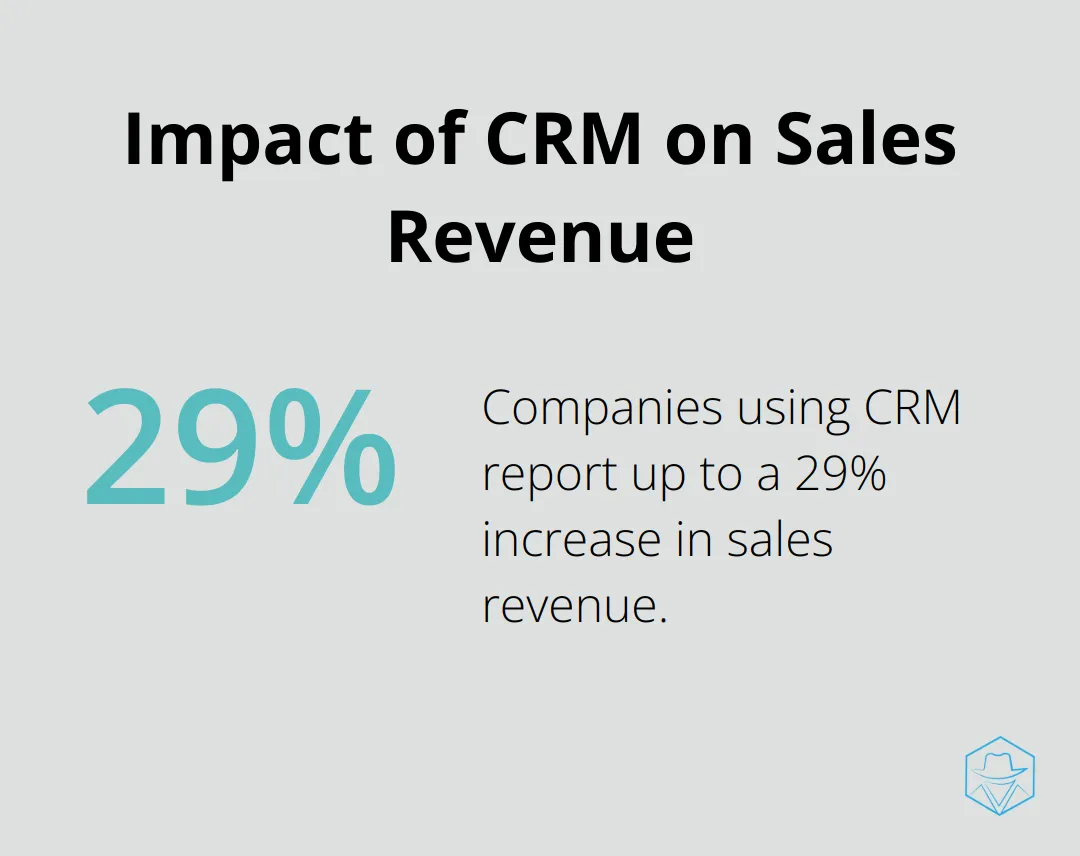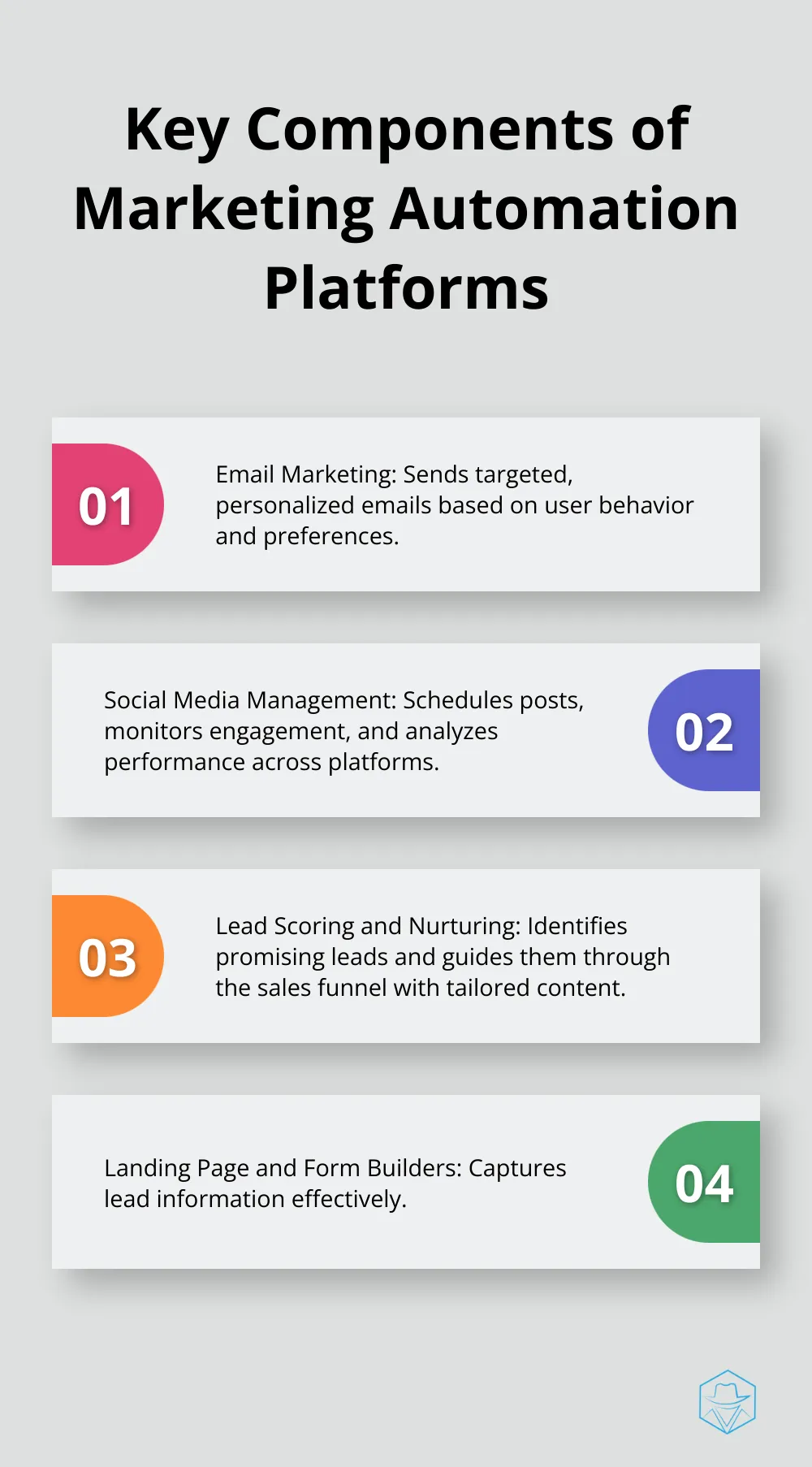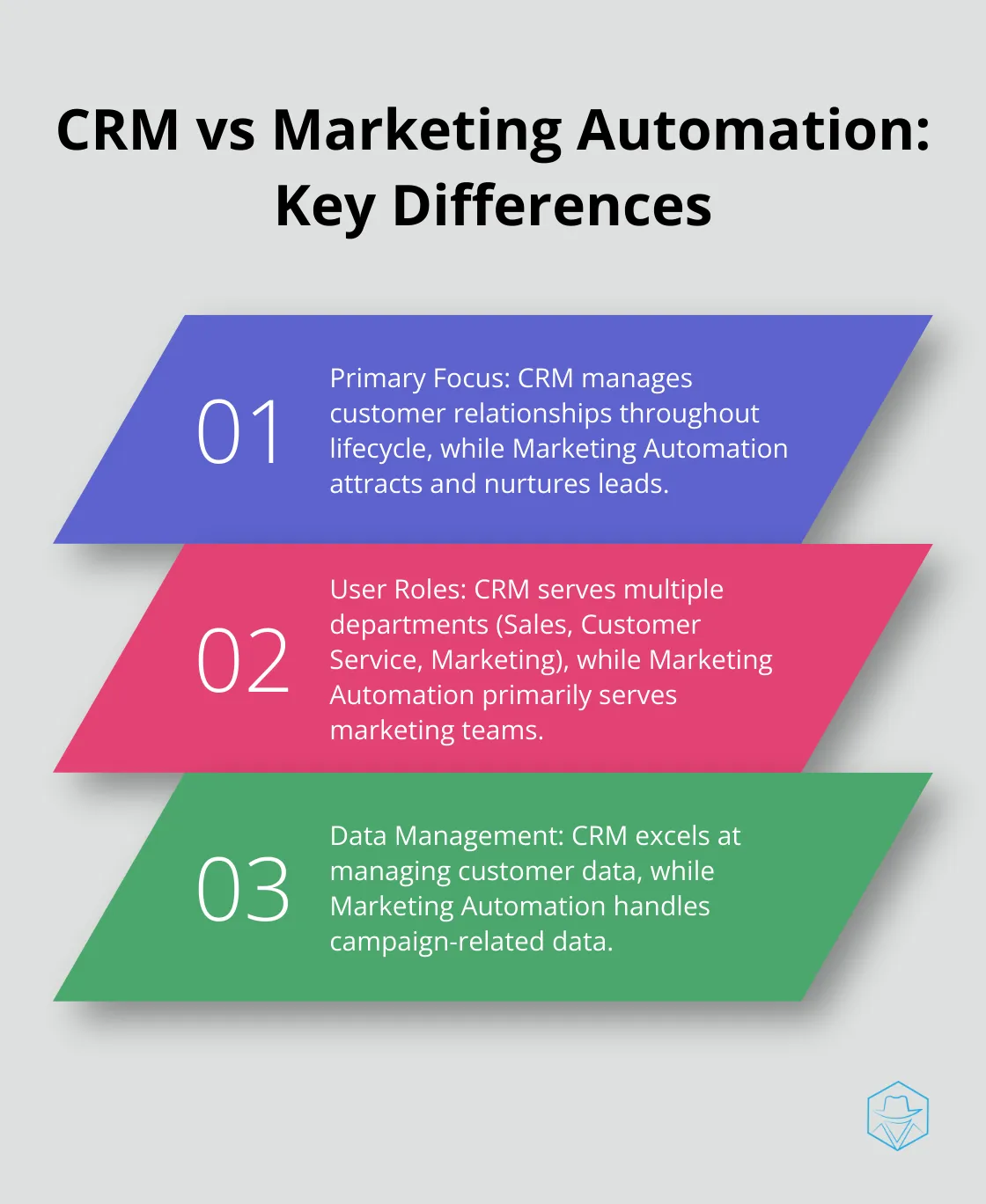CRM vs Marketing Automation: Which Do You Need?

At Drop Cowboy, we often field questions about CRM vs marketing automation. These two powerful tools can significantly boost your business operations, but understanding their differences is key.
In this post, we’ll break down the core functions of CRM and marketing automation systems, explore their unique benefits, and help you determine which solution best fits your business needs.
What Is a CRM System?
The Foundation of Customer Relationship Management
Customer Relationship Management (CRM) systems form the cornerstone of modern business operations. These powerful tools centralize customer data, making it accessible to sales, marketing, and customer service teams. CRM systems track every interaction, from initial contact to post-sale support, providing a comprehensive view that allows businesses to tailor their approach to each customer’s needs.
Key Features That Drive Business Success
Modern CRM platforms offer a range of features designed to boost efficiency and effectiveness:
- Contact Management: Stores detailed customer profiles (including communication history and preferences).
- Sales Automation: Tracks leads, manages pipelines, and forecasts sales with greater accuracy.
- Reporting and Analytics: Provides insights into sales performance, customer behavior, and team productivity.
- Integration Capabilities: Connects with other business tools like email, calendar, and marketing automation platforms.
Tangible Benefits for Your Organization
Implementing a CRM system can lead to significant improvements across your organization:
- Increased Sales: Companies using CRM report up to a 29% increase in sales revenue (Nucleus Research).
- Enhanced Customer Service: With instant access to customer history, support teams resolve issues faster and more effectively.
- Data-Driven Decision Making: Real-time analytics help managers make informed strategic decisions.
- Improved Team Collaboration: Shared access to customer data ensures all departments align in their approach.

Selecting the Right CRM for Your Needs
When choosing a CRM, consider your specific business requirements. Look for systems that offer:
- User-friendly interfaces to ensure high adoption rates
- Scalability to grow with your business
- Robust mobile capabilities for on-the-go access
- Strong security features to protect sensitive customer data
The best CRM is one that your team will actually use. Involve key stakeholders in the selection process to ensure buy-in and maximize the system’s potential.
As we move forward, it’s important to understand how CRM systems differ from marketing automation tools. While both play crucial roles in business growth, their functions and focus areas vary significantly. Let’s explore the world of marketing automation and how it complements CRM in the next section.
Unleashing the Power of Marketing Automation
Defining Marketing Automation
Marketing automation revolutionizes business marketing strategies. This software streamlines, automates, and measures marketing tasks and workflows. It enables companies to nurture prospects with personalized content, converting them into customers and turning customers into brand advocates.
Key Components of Marketing Automation Platforms
Marketing automation platforms include several essential elements:

Measurable Benefits for Businesses
Implementing marketing automation yields significant advantages:
- Increased Productivity: A study by Nucleus Research shows a 14.5% increase in sales productivity.
- Cost Reduction: The same study reports a 12.2% reduction in marketing overhead.
- Personalization at Scale: Delivers the right message to the right person at the right time, leading to higher engagement and conversions.
Optimizing Resources and Enhancing Efficiency
Marketing automation frees teams from repetitive tasks, allowing focus on strategic initiatives. It automates routine processes like email sends, social media posting, and lead scoring. This shift enables marketers to allocate more time to creative and analytical work that drives business growth.
Data-Driven Decision Making
The analytics capabilities of marketing automation platforms provide invaluable insights into campaign performance. Marketers track key metrics (such as open rates, click-through rates, and conversion rates) in real-time. This data-driven approach enables continuous optimization of marketing efforts, ensuring efficient resource allocation.
Choosing a platform that aligns with specific business needs remains essential. Some platforms, like Drop Cowboy, integrate advanced marketing automation features with innovative communication tools. This combination allows businesses to create effective, multi-channel marketing campaigns that drive engagement and conversions.
The world of CRM and marketing automation offers powerful tools for business growth. However, understanding the distinctions between these systems proves vital. In the next section, we’ll explore the key differences between CRM and marketing automation, helping you determine the right solution for your business needs.
CRM vs Marketing Automation: Key Differences

Primary Focus and Objectives
CRM systems manage customer relationships throughout their lifecycle. They track interactions, store contact information, and provide insights into customer behavior. The main objective is to improve customer retention and increase sales efficiency.
Marketing automation attracts and nurtures leads before they become customers. It automates repetitive marketing tasks, personalizes communication, and moves prospects through the sales funnel.
User Roles and Departments
CRM systems serve multiple departments:
- Sales teams use CRM to manage leads and track opportunities
- Customer service representatives access customer history and resolve issues quickly
- Marketing teams utilize CRM data to segment audiences and personalize campaigns
Marketing automation primarily serves marketing departments. It allows marketers to create, execute, and analyze campaigns across various channels. Sales teams also benefit from the lead scoring and nurturing capabilities of these platforms.
Data Management and Analytics
CRM systems excel at managing customer data. They provide a centralized database of customer information (including contact details, purchase history, and communication logs). Analytics in CRM focus on sales metrics, customer retention rates, and service performance.
Marketing automation platforms handle campaign-related data. They track email open rates, click-through rates, and conversion metrics. The analytics in these systems focus on campaign performance, lead behavior, and ROI of marketing efforts.
Integration with Other Business Tools
CRM systems often integrate with:
- Email platforms
- Customer support software
- Accounting systems
- ERP (Enterprise Resource Planning) solutions
Marketing automation typically integrates with:
- Social media platforms
- Content management systems
- Analytics tools
- Ad platforms
Scalability and Customization
CRM systems offer high scalability, accommodating businesses as they grow. They often provide customizable fields and workflows to match specific business processes.
Marketing automation platforms focus on scalability in terms of campaign volume and complexity. They offer customizable templates and workflows for various marketing channels.
Final Thoughts
The choice between CRM and marketing automation depends on your business goals. CRM systems excel at managing customer relationships and improving sales processes, while marketing automation streamlines marketing efforts and nurtures leads effectively. Many businesses benefit from implementing both systems to create a powerful synergy that drives growth and enhances customer experiences.
Integration plays a key role in maximizing the return on investment for CRM and marketing automation. A unified approach to customer engagement allows for seamless data flow and more accurate reporting. This integration enables businesses to create a more personalized and effective customer journey, leveraging the strengths of both systems.
At Drop Cowboy, we understand the importance of effective communication in CRM and marketing automation strategies. Our innovative communication platform offers features that can enhance your outreach efforts and improve customer engagement. Whether you use CRM, marketing automation, or both, Drop Cowboy can help you deliver personalized messages at scale, aligning your communication strategy with your broader business goals.
blog-dropcowboy-com
Related posts

April 14, 2025
How to Integrate CJ Dropshipping with Shopify
Integrate CJ Dropshipping with Shopify easily and boost your e-commerce success. Get practical tips and seamless solutions for your online store today.

March 21, 2025
How to Boost E-commerce Sales with SMS Marketing
Boost e-commerce sales effortlessly with SMS ecommerce strategies. Discover practical tips and proven methods to engage customers and increase revenue.

March 12, 2025
How to Create an Effective Marketing Automation Journey
Boost your business by creating an effective marketing automation journey. Streamline processes, engage customers, and drive growth effortlessly.

March 13, 2025
How to Master Marketing Automation Best Practices
Optimize your strategy with marketing automation best practices. Boost efficiency, engage customers, and increase conversion rates effectively.

April 17, 2025
Best Shopify Apps to Boost Your Online Store
Boost sales with the best Shopify apps. Discover top tools to enhance functionality, improve customer experience, and streamline your online store.

March 8, 2025
Marketing Strategy: Text and Cases Explained
Explore effective marketing strategy text and cases. Discover practical tools and insights for successful campaigns with real-world examples.